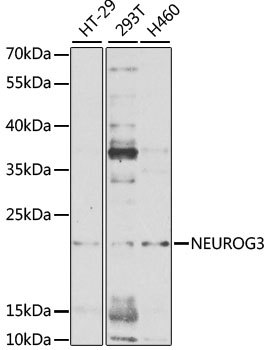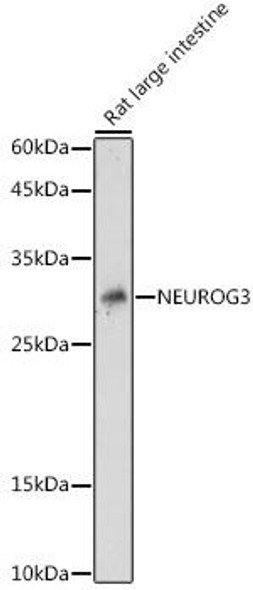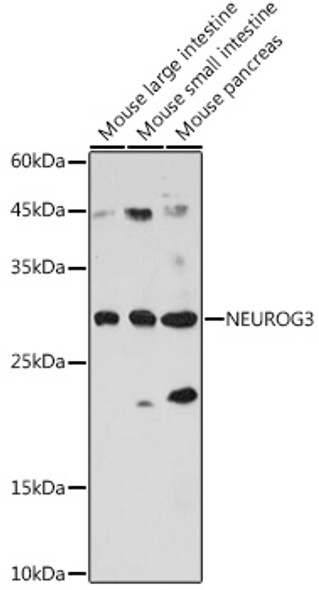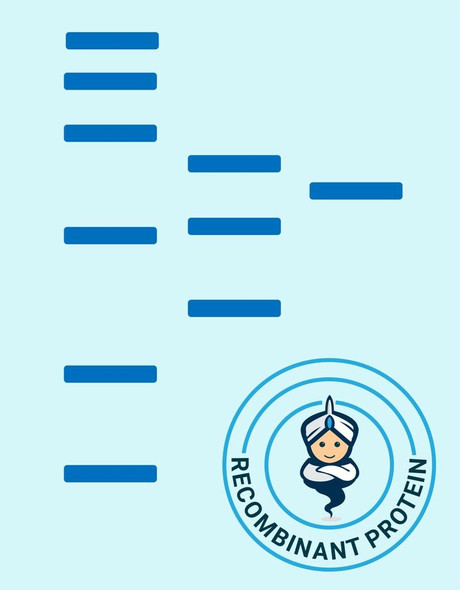Developmental Biology
Anti-NEUROG3 Antibody (CAB2772)
- SKU:
- CAB2772
- Product Type:
- Antibody
- Reactivity:
- Human
- Reactivity:
- Mouse
- Reactivity:
- Rat
- Host Species:
- Rabbit
- Isotype:
- IgG
- Research Area:
- Developmental Biology
Description
| Antibody Name: | Anti-NEUROG3 Antibody |
| Antibody SKU: | CAB2772 |
| Antibody Size: | 20uL, 50uL, 100uL |
| Application: | WB |
| Reactivity: | Human, Mouse, Rat |
| Host Species: | Rabbit |
| Immunogen: | Recombinant fusion protein containing a sequence corresponding to amino acids 1-83 of human NEUROG3 (NP_066279.2). |
| Application: | WB |
| Recommended Dilution: | WB 1:500 - 1:1000 |
| Reactivity: | Human, Mouse, Rat |
| Positive Samples: | HT-29, 293T, H460 |
| Immunogen: | Recombinant fusion protein containing a sequence corresponding to amino acids 1-83 of human NEUROG3 (NP_066279.2). |
| Purification Method: | Affinity purification |
| Storage Buffer: | Store at -20'C. Avoid freeze / thaw cycles. Buffer: PBS with 0.02% sodium azide, 50% glycerol, pH7.3. |
| Isotype: | IgG |
| Sequence: | MTPQ PSGA PTVQ VTRE TERS FPRA SEDE VTCP TSAP PSPT RTRG NCAE AEEG GCRG APRK LRAR RGGR SRPK SELA LSKQ RRS |
| Gene ID: | 50674 |
| Uniprot: | Q9Y4Z2 |
| Cellular Location: | Nucleus |
| Calculated MW: | 23kDa |
| Observed MW: | 23kDa |
| Synonyms: | NEUROG3, Atoh5, Math4B, NGN-3, bHLHa7, ngn3 |
| Background: | The protein encoded by this gene is a basic helix-loop-helix (bHLH) transcription factor involved in neurogenesis. The encoded protein likely acts as a heterodimer with another bHLH protein. Defects in this gene are a cause of congenital malabsorptive diarrhea 4 (DIAR4). |
| UniProt Protein Function: | neurogenin 3: Acts as a transcriptional regulator. Together with NKX2- 2, initiates transcriptional activation of NEUROD1. Involved in neurogenesis. Also required for the specification of a common precursor of the 4 pancreatic endocrine cell types. Defects in NEUROG3 are the cause of diarrhea type 4 (DIAR4). DIAR4 is a characterized by severe, life- threatening watery diarrhea associated with generalized malabsorption and a paucity of enteroendocrine cells. |
| UniProt Protein Details: | Protein type:Cell development/differentiation; Transcription factor; DNA-binding Chromosomal Location of Human Ortholog: 10q21.3 Cellular Component: cytoplasm; nucleus Molecular Function:protein dimerization activity; chromatin DNA binding; double-stranded DNA binding; transcription coactivator activity Biological Process: nervous system development; central nervous system development; transcription, DNA-dependent; regulation of dendrite morphogenesis; negative regulation of transcription from RNA polymerase II promoter; endocrine pancreas development; peripheral nervous system development; epithelial cell differentiation; spinal cord development; forebrain development; positive regulation of transcription from RNA polymerase II promoter; positive regulation of transcription factor activity; positive regulation of neuron differentiation; hindbrain development Disease: Diarrhea 4, Malabsorptive, Congenital |
| NCBI Summary: | The protein encoded by this gene is a basic helix-loop-helix (bHLH) transcription factor involved in neurogenesis. The encoded protein likely acts as a heterodimer with another bHLH protein. Defects in this gene are a cause of congenital malabsorptive diarrhea 4 (DIAR4).[provided by RefSeq, May 2010] |
| UniProt Code: | Q9Y4Z2 |
| NCBI GenInfo Identifier: | 229462908 |
| NCBI Gene ID: | 50674 |
| NCBI Accession: | Q9Y4Z2.2 |
| UniProt Secondary Accession: | Q9Y4Z2,Q5VVI0, Q6DJX6, Q9BY24, |
| UniProt Related Accession: | Q9Y4Z2 |
| Molecular Weight: | 214 |
| NCBI Full Name: | Neurogenin-3 |
| NCBI Synonym Full Names: | neurogenin 3 |
| NCBI Official Symbol: | NEUROG3 |
| NCBI Official Synonym Symbols: | ngn3; Atoh5; NGN-3; Math4B; bHLHa7 |
| NCBI Protein Information: | neurogenin-3; protein atonal homolog 5; class A basic helix-loop-helix protein 7 |
| UniProt Protein Name: | Neurogenin-3 |
| UniProt Synonym Protein Names: | Class A basic helix-loop-helix protein 7; bHLHa7; Protein atonal homolog 5 |
| UniProt Gene Name: | NEUROG3 |
| UniProt Entry Name: | NGN3_HUMAN |







